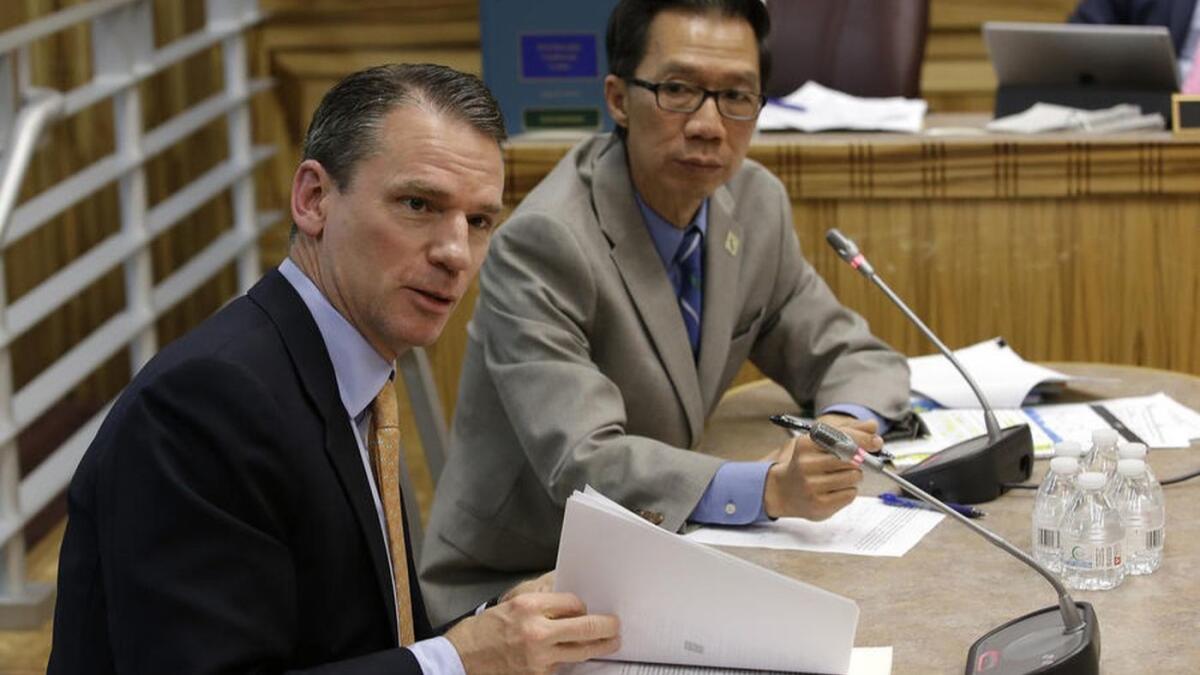Proposed 2020 ballot measure would tighten California data privacy law

SACRAMENTO — Californians would have more control over the collection of their health and financial data and there would be stiff penalties for companies that wrongly share and sell data about children under a November 2020 statewide ballot measure that will be submitted on Wednesday.
The proposal was drafted by San Francisco real estate developer Alastair Mactaggart, who last year used the threat of a ballot measure to pressure the California Legislature to enact sweeping new privacy protections. Although that law doesn’t take effect until January, Mactaggart said that it’s important to press ahead and do more.
“I think it’s a great baseline,” he said of the 2018 law, which will provide consumers with new information about their data that has been shared or sold. “But I think there are additional rights that Californians deserve.”
A central component of the ballot measure is additional consumer control over what Mactaggart calls “sensitive personal information,” including data on a person’s race, health, Social Security number and recent locations using GPS technology. If enacted by voters, the law would grant consumers the right to prevent that kind of data from being sold and or used for advertising purposes.
“Companies aren’t taking their foot off the gas” in using this kind of data, Mactaggart said. “They’re saying full speed ahead.”
The new ballot measure seeks to enhance efforts in the 2018 law to restrict access to information regarding children and teenagers. While the existing statute focuses on permission to sell that data, the new proposal would require a company obtain permission before collecting data from consumers younger than 16 — an “opt-in” provision. If the person is 13 or younger, the company would need approval from a parent or guardian to collect data. Mactaggart cited recent concerns about the data collection practices of YouTube as an example of why California law needs to be strengthened when it comes to children.
But during state Capitol discussions this year, several privacy groups wanted “opt-in” rules for more than just children and teenagers, a more sweeping system of protections similar to privacy rules established by the European Union in 2018.
Voters would also be asked under the ballot measure to force technology companies to disclose information about the algorithms used to target consumers with specific advertisements. The ballot measure would also create a new state agency to field privacy questions and complaints, rather than leaving oversight to the California attorney general’s office.
State lawmakers sent a number of privacy-related bills to Gov. Gavin Newsom‘s desk before adjourning for the year on Sept. 14, but none that would make broad changes to the 2018 law, the California Consumer Privacy Act. They included a failed effort to expand the rights of consumers to file civil lawsuits in the event of an alleged violation of CCPA.
While some advocates praised this year’s legislative session for not producing bills that weakened CCPA’s provisions, others wanted the Legislature to strengthen the law.
“We really missed the opportunity to think big about this,” said state Sen. Bob Hertzberg (D-Van Nuys), who has worked with Mactaggart on the issue. “But this initiative has the benefit of everything we’ve learned.”
Mactaggart spent $3.1 million of his own money to gather signatures for his first privacy measure in 2018 and said he’s prepared to spend the same, or more, on this effort. He has said he came to the issue somewhat by accident after having a cocktail party conversation with a Silicon Valley technology engineer that left him startled when he learned about the kinds of information routinely being gathered, sold and bought by companies with relatively low public profiles.
After his first measure earned a spot on last November’s ballot, he agreed to negotiate with legislators in search of a way to avoid a lengthy and expensive political campaign. California election law allows the proponent of a ballot initiative a window of time in which to withdraw the measure, even if voter signatures have already been submitted. That law, established five years ago, was designed to foster more compromise with the Legislature.
One week before the 2018 deadline to certify the list of statewide propositions, Mactaggart and Democratic legislative leaders announced a compromise that was quickly signed by then-Gov. Jerry Brown.
Mactaggart doubted that he would do the same this time around.
“I don’t think any substantial gains like this are made in the Legislature,” he said. “I’m really happy what I did [in 2018]. It got us a beachhead. But I like the idea of having a new high-water mark that can’t be undone.”
More to Read
Sign up for Essential California
The most important California stories and recommendations in your inbox every morning.
You may occasionally receive promotional content from the Los Angeles Times.











